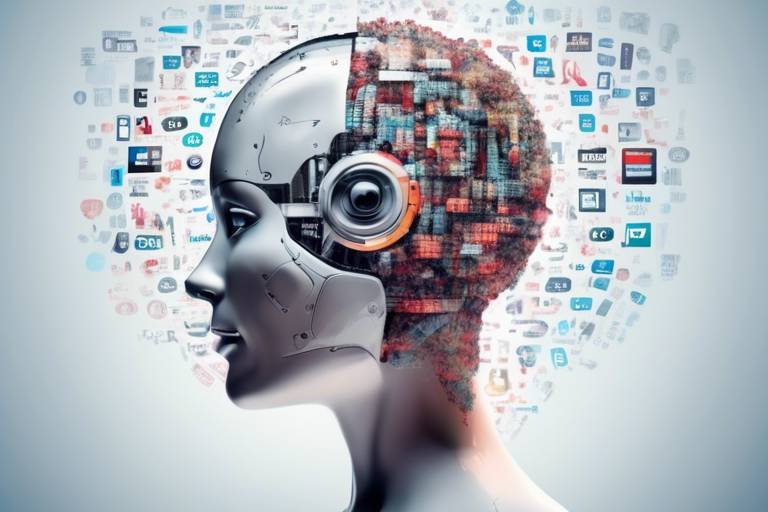The Underestimated Power of AI in Middle Management
In today's fast-paced business environment, the role of middle management is often viewed as a bridge between upper management and the workforce. However, with the advent of artificial intelligence (AI), this perspective is rapidly changing. AI is not just a tech buzzword; it's a transformative force that can redefine how middle managers operate, making their roles more impactful than ever. Imagine having a digital assistant that can sift through mountains of data, providing insights at lightning speed—this is the reality AI brings to the table.
Middle managers are typically responsible for making crucial decisions that affect their teams and the organization as a whole. The challenge? They often have to rely on outdated methods that can be time-consuming and prone to error. This is where AI steps in, offering tools that can enhance decision-making processes. By leveraging AI, middle managers can analyze vast amounts of data quickly and accurately, uncovering trends and insights that would have taken hours or even days to identify. This not only leads to better decision-making but also empowers managers to act swiftly in a rapidly changing market.
Moreover, AI can streamline communication within teams. In an age where remote work is becoming the norm, effective communication is more critical than ever. AI-driven platforms can facilitate seamless interactions, ensuring that everyone is on the same page. Imagine a scenario where a middle manager can easily gather feedback from team members through AI chatbots or automated surveys, allowing for real-time adjustments to projects or workflows. This fosters a culture of collaboration and transparency, which is essential for any successful organization.
Another significant advantage of AI in middle management is the automation of routine tasks. Picture a middle manager who spends hours each week on administrative duties—scheduling meetings, compiling reports, and tracking project statuses. With AI, these tasks can be automated, freeing up valuable time for managers to focus on strategic initiatives. This shift not only enhances productivity but also allows managers to allocate resources more effectively, driving overall organizational success.
Furthermore, AI can enhance employee engagement by providing insights into team sentiment and morale. Middle managers often have their fingers on the pulse of their teams, but understanding employee feelings can be challenging. AI tools can analyze employee feedback and engagement metrics, enabling managers to identify potential issues before they escalate. By proactively addressing concerns, managers can create a more positive work environment, which ultimately leads to higher retention rates and improved team performance.
In conclusion, the underestimated power of AI in middle management cannot be overstated. From enhancing decision-making processes to streamlining communication and automating routine tasks, AI is set to revolutionize how middle managers operate. As organizations continue to embrace this technology, the potential for improved efficiency and effectiveness will only grow, making middle management a more strategic and vital component of organizational success.
- How does AI improve decision-making for middle managers?
AI analyzes large datasets quickly, providing actionable insights that help managers make informed choices. - Can AI really enhance communication within teams?
Yes, AI tools can facilitate real-time feedback and streamline communication channels, improving collaboration. - What routine tasks can AI automate for middle managers?
AI can handle scheduling, reporting, and tracking project statuses, allowing managers to focus on strategic initiatives. - How does AI contribute to employee engagement?
AI tools can assess employee sentiment, enabling managers to address concerns proactively and foster a positive work environment.

Enhancing Decision-Making Processes
This article explores the transformative role of artificial intelligence in middle management, examining its potential to enhance decision-making, improve efficiency, and reshape organizational structures.
In today's fast-paced business environment, the ability to make informed decisions quickly is more crucial than ever, especially for middle managers who often find themselves balancing the needs of their teams with the expectations of upper management. Enter artificial intelligence—the game changer that can revolutionize decision-making processes. Imagine having a tool that can sift through mountains of data in a fraction of the time it would take a human, providing insights that are not only accurate but also actionable. AI can analyze trends, forecast outcomes, and even suggest the best course of action based on historical data. This means that middle managers can spend less time guessing and more time implementing strategies that drive results.
For instance, AI algorithms can assess customer feedback, sales reports, and market trends to help managers identify which products are performing well and which are not. With this information at their fingertips, managers can make decisions that are backed by data rather than intuition alone. This leads to better resource allocation, more effective marketing strategies, and ultimately, increased profitability. But how exactly does this work? Here are a few ways AI enhances decision-making:
- Data Analysis: AI can process and analyze large datasets, uncovering patterns and insights that might go unnoticed.
- Predictive Analytics: By utilizing historical data, AI can predict future trends, helping managers anticipate market changes.
- Scenario Simulation: AI tools can simulate various business scenarios, allowing managers to evaluate potential outcomes before making decisions.
Moreover, AI can help in mitigating risks associated with decision-making. By providing a comprehensive analysis of potential risks and rewards, middle managers can weigh their options more effectively. This is particularly valuable in industries where the stakes are high, and the margin for error is slim. In fact, a study by McKinsey found that organizations that leverage AI for decision-making see a 20-30% increase in performance compared to those that do not.
However, it's essential to remember that while AI can enhance decision-making, it should not replace human judgment. The best outcomes occur when AI tools complement the expertise and intuition of middle managers. Think of it as having a co-pilot: the AI provides data-driven insights while the manager navigates the complexities of human behavior and organizational culture. Together, they can steer the organization toward success.
AI facilitates improved communication channels, allowing middle managers to connect with their teams more effectively, thereby fostering collaboration and transparency within the organization.
By automating repetitive tasks, AI frees up middle managers to focus on strategic initiatives, enhancing productivity and enabling them to allocate resources more efficiently.
AI solutions can handle administrative tasks, such as scheduling and reporting, which reduces the workload on middle managers and allows them to concentrate on leadership responsibilities.
AI-driven tools can provide insights into employee sentiment and engagement levels, enabling middle managers to address concerns proactively and create a more positive work environment.
AI can track and analyze employee performance metrics, allowing middle managers to identify strengths and weaknesses, facilitating targeted development initiatives and improving overall team performance.
AI can personalize training programs for employees, ensuring that middle managers have the tools to develop their teams effectively and meet organizational goals.
Using AI, middle managers can create customized learning experiences that cater to individual employee needs, promoting skill development and career growth within the organization.
AI can assess the impact of training programs by analyzing performance data, helping middle managers refine their approaches to employee development and maximize return on investment.
Q: How can AI improve decision-making in middle management?
A: AI enhances decision-making by providing data-driven insights, predictive analytics, and scenario simulations, allowing managers to make informed choices quickly.
Q: Is AI a replacement for human judgment?
A: No, AI should complement human judgment. The best outcomes occur when AI tools are used alongside the expertise and intuition of middle managers.
Q: What are some examples of AI tools used in decision-making?
A: Examples include predictive analytics software, data visualization tools, and scenario simulation platforms that help managers analyze data and forecast outcomes.

Streamlining Communication
In today's fast-paced business environment, effective communication is the lifeblood of any organization. Imagine trying to navigate a ship through stormy seas without a reliable compass; that’s what it feels like when communication breaks down in a team. Artificial Intelligence (AI) is stepping in to act as that compass, providing middle managers with tools that not only enhance communication but also foster a culture of collaboration and transparency. With AI, middle managers can break down silos and ensure that everyone is on the same page, no matter where they are located.
AI-driven communication platforms can analyze communication patterns and suggest improvements. For instance, if a team is consistently missing deadlines, AI can identify the bottlenecks in communication and provide actionable insights. This allows middle managers to make informed decisions on how to restructure communication flows to enhance efficiency. Additionally, AI can facilitate real-time feedback, enabling teams to adjust their strategies on the fly rather than waiting for scheduled meetings. This agility can be a game-changer in achieving organizational goals.
Furthermore, AI tools can automate routine communication tasks, such as sending reminders for meetings or updates on project status. This automation not only saves time but also reduces the likelihood of important messages getting lost in the shuffle. Imagine having a virtual assistant who ensures that every team member is aware of their responsibilities and deadlines without the manager having to lift a finger! This allows middle managers to focus on more strategic aspects of their role while ensuring that their teams remain informed and engaged.
To illustrate the impact of AI on communication, consider the following table that outlines some of the key benefits:
| AI Communication Benefits | Description |
|---|---|
| Real-Time Insights | AI analyzes communication patterns to provide actionable insights for middle managers. |
| Automated Reminders | Routine tasks like meeting reminders can be automated, saving time and improving efficiency. |
| Enhanced Collaboration | AI tools facilitate better collaboration by ensuring everyone is informed and aligned. |
| Feedback Loops | Real-time feedback mechanisms allow for quick adjustments in strategies and communication. |
In addition to these benefits, AI can also help in fostering a more inclusive environment. By analyzing communication styles and preferences, AI can suggest tailored approaches for different team members. This means that a middle manager can adapt their communication strategy to suit various personalities, ensuring that everyone feels heard and valued. Just like a skilled conductor harmonizes different instruments to create a beautiful symphony, AI helps managers orchestrate effective communication within their teams.
Ultimately, the integration of AI in communication processes not only streamlines interactions but also builds a stronger, more cohesive team. As middle managers embrace these technologies, they can cultivate an environment where collaboration thrives, leading to innovative solutions and improved performance across the board. In a world where change is the only constant, having robust communication channels powered by AI can make all the difference in navigating the complexities of modern business.
- How does AI improve communication in middle management?
AI enhances communication by providing real-time insights, automating routine tasks, and facilitating better collaboration among team members. - Can AI help in managing remote teams?
Absolutely! AI tools can bridge the communication gap for remote teams by ensuring everyone stays informed and aligned, regardless of their location. - What are the risks of relying too much on AI for communication?
While AI offers numerous benefits, over-reliance can lead to a lack of personal touch. It’s essential to balance AI tools with genuine human interaction.

Automating Routine Tasks
In today's fast-paced business environment, middle managers often find themselves juggling a plethora of responsibilities. From overseeing team performance to ensuring that projects stay on track, their plates are overflowing. This is where the magic of artificial intelligence comes into play. By automating routine tasks, AI not only streamlines workflows but also empowers middle managers to focus on what truly matters—strategic initiatives that drive organizational success.
Imagine a world where mundane tasks like scheduling meetings, generating reports, and managing emails are handled by intelligent systems. Sounds like a dream, right? Well, it’s becoming a reality. AI tools can take over these repetitive duties, allowing middle managers to reclaim precious hours in their day. This shift not only enhances productivity but also fosters a more engaged and innovative work environment.
For instance, let's consider the task of report generation. Traditionally, this could take hours, if not days, depending on the complexity of the data involved. With AI, data can be compiled, analyzed, and presented in a matter of minutes. This not only saves time but also reduces the likelihood of human error. Middle managers can then use this newfound time to engage with their teams, brainstorm innovative solutions, and drive projects forward.
Furthermore, AI can assist in prioritizing tasks based on urgency and importance. Imagine receiving a smart notification that suggests which tasks to tackle first, based on deadlines and resource availability. This level of automation not only enhances efficiency but also helps managers make informed decisions quickly. By utilizing AI to manage their workload, middle managers can focus more on leadership and less on administrative overhead.
The benefits of automating routine tasks extend beyond mere time savings. It also contributes to a more positive workplace culture. Employees often feel more valued when their managers are not bogged down by trivial tasks. Instead, they can provide mentorship, support, and guidance, fostering a sense of collaboration and teamwork. In fact, a recent study showed that companies that implemented AI-driven automation saw a 30% increase in employee satisfaction within the first year.
To illustrate the impact of automation, consider the following table:
| Task | Time Saved (per week) | Impact on Management |
|---|---|---|
| Scheduling Meetings | 2-3 hours | More time for strategic planning |
| Report Generation | 4-5 hours | Enhanced data-driven decision making |
| Email Management | 1-2 hours | Improved team communication |
In summary, the automation of routine tasks through AI is not just a convenience; it represents a significant shift in how middle managers can operate. By freeing them from the shackles of repetitive work, AI allows them to embrace a more strategic and impactful role within their organizations. The future looks bright for those who harness these tools effectively!
- What tasks can AI automate for middle managers? AI can automate tasks such as scheduling, report generation, and email management.
- How does automating routine tasks benefit middle managers? It saves time, reduces errors, and allows managers to focus on strategic initiatives.
- Will AI replace middle managers? No, AI is designed to assist and enhance the capabilities of middle managers, not replace them.
- How can I implement AI in my management practices? Start by identifying repetitive tasks in your workflow and explore AI tools that can automate those processes.

Reducing Administrative Burden
In today’s fast-paced corporate environment, middle managers often find themselves drowning in a sea of administrative tasks. These responsibilities can range from scheduling meetings to generating reports, leaving little room for strategic thinking and leadership. This is where the transformative power of AI comes into play. By automating these routine processes, AI not only alleviates the administrative burden but also empowers managers to focus on what truly matters: leading their teams effectively.
Imagine a world where middle managers can spend their time innovating rather than filling out endless spreadsheets. AI tools can take over mundane tasks such as:
- Scheduling Meetings: AI can analyze calendars and suggest optimal meeting times for all participants, eliminating the back-and-forth emails that often plague scheduling.
- Generating Reports: With AI, managers can automatically generate performance reports, pulling data from various sources in real-time, ensuring that decision-making is based on the most current information.
- Data Entry: AI can handle repetitive data entry tasks, drastically reducing the risk of human error and freeing up valuable time for managers.
By implementing AI solutions, organizations can see a significant reduction in the time spent on these administrative tasks. For example, consider the following table that highlights the average time saved per week by using AI tools for specific administrative functions:
| Administrative Task | Time Spent Without AI (Hours/Week) | Time Spent With AI (Hours/Week) | Time Saved (Hours/Week) |
|---|---|---|---|
| Scheduling Meetings | 5 | 1 | 4 |
| Generating Reports | 4 | 0.5 | 3.5 |
| Data Entry | 6 | 1 | 5 |
As shown in the table, the potential time savings are substantial. This newfound time can be redirected towards strategic initiatives, team development, and fostering a positive workplace culture. Middle managers can engage in meaningful conversations with their teams, brainstorm innovative ideas, and ultimately drive the organization towards its goals.
Moreover, reducing the administrative burden through AI fosters a culture of transparency and collaboration. When managers are less bogged down by paperwork, they can focus on building relationships with their team members, understanding their challenges, and providing the necessary support. This shift not only boosts morale but also enhances overall productivity, creating a win-win situation for both managers and employees.
In conclusion, the integration of AI into middle management processes is not just a luxury; it’s quickly becoming a necessity. By reducing administrative burdens, organizations can empower their leaders to focus on strategic decision-making and team engagement, ultimately paving the way for a more efficient and dynamic workplace.
- How does AI reduce the workload of middle managers?
AI automates routine tasks such as scheduling and reporting, allowing managers to focus on leadership and strategic initiatives. - What are some examples of AI tools for middle management?
Tools like automated scheduling software, performance analytics platforms, and AI-driven reporting systems are commonly used. - Can AI improve employee engagement?
Yes, AI can provide insights into employee sentiment, helping managers address concerns and foster a positive work environment. - Is implementing AI expensive?
The initial investment can vary, but the long-term savings in time and increased productivity often outweigh the costs.

Enhancing Employee Engagement
In today's fast-paced work environment, employee engagement has become a crucial factor for organizational success. Imagine walking into a workplace where everyone is motivated, enthusiastic, and aligned with the company’s goals. Sounds like a dream, right? Well, with the help of artificial intelligence (AI), this dream can become a reality. AI-driven tools can provide middle managers with invaluable insights into employee sentiment and engagement levels. By analyzing data from various sources like surveys, feedback forms, and even social media, AI can help managers understand how their teams are feeling.
But why is this important? Well, when middle managers can pinpoint areas where employees might be feeling disengaged or frustrated, they can take proactive measures to address these concerns. For instance, if AI analytics reveal that a significant number of employees are dissatisfied with their work-life balance, managers can implement flexible working hours or wellness programs to tackle this issue head-on. This not only boosts morale but also fosters a culture of transparency and support within the organization.
Moreover, AI can facilitate personalized communication, allowing managers to connect with their team members on an individual level. Imagine receiving a message from your manager acknowledging your hard work and suggesting a personalized development plan tailored just for you. Such interactions can significantly enhance employee satisfaction and loyalty. The ability to understand and respond to employee needs in real-time creates a more engaged workforce, which is essential for driving productivity and innovation.
Furthermore, AI tools can help managers track engagement initiatives' effectiveness. By continuously monitoring employee feedback and performance data, they can assess whether their strategies are yielding the desired results. This data-driven approach enables middle managers to refine their engagement tactics, ensuring they are always aligned with their team's evolving needs.
In summary, leveraging AI to enhance employee engagement is not just about keeping your team happy; it's about creating a thriving workplace where everyone feels valued and empowered. By utilizing AI tools to gain insights into employee sentiment, managers can foster a positive work environment that encourages collaboration and drives success. In a world where employee engagement can make or break an organization, embracing AI could be the key to unlocking your team's full potential.
- What is the role of AI in enhancing employee engagement? AI helps middle managers analyze employee sentiment and engagement levels, enabling them to address concerns proactively.
- How can AI personalize communication with employees? AI tools can analyze data to provide insights that allow managers to tailor their communication and support to individual employees.
- Can AI track the effectiveness of engagement initiatives? Yes, AI can continuously monitor feedback and performance data to assess the impact of various engagement strategies.
- Why is employee engagement important? High employee engagement leads to increased productivity, lower turnover rates, and a more positive workplace culture.

Data-Driven Performance Monitoring
In the fast-paced world of business, the ability to monitor and evaluate employee performance is crucial for middle managers looking to drive their teams toward success. With the integration of artificial intelligence, performance monitoring has evolved from a cumbersome, subjective process into a streamlined, data-driven approach. Imagine having a powerful ally that can sift through mountains of data, pinpointing trends and insights that would otherwise go unnoticed. This is the magic of AI in performance monitoring.
AI tools can track various performance metrics, from individual productivity levels to team collaboration efficiency. By analyzing this data, middle managers can gain a comprehensive understanding of their team's strengths and weaknesses. For instance, AI can highlight which employees consistently exceed their targets and which may need additional support or training. This level of insight allows managers to tailor their development initiatives effectively, ensuring that each team member receives the attention they need to thrive.
Moreover, AI can provide real-time feedback, a game-changer in performance monitoring. Instead of waiting for quarterly reviews, managers can receive immediate insights into how their team is performing. This immediacy allows for proactive management, enabling leaders to address issues as they arise rather than letting them fester. Imagine a coach who can adjust strategies mid-game based on real-time performance data—this is the kind of agility AI brings to middle management.
To illustrate the impact of data-driven performance monitoring, consider the following table that outlines key performance metrics that AI can track:
| Performance Metric | Description | AI Application |
|---|---|---|
| Productivity Levels | Measures output against set goals. | AI analyzes completed tasks versus assigned work. |
| Collaboration Efficiency | Assesses teamwork and communication effectiveness. | AI evaluates communication patterns and project contributions. |
| Engagement Scores | Tracks employee satisfaction and involvement. | AI analyzes survey responses and sentiment analysis. |
| Skill Development | Monitors progress in employee training. | AI evaluates training completion and performance improvements. |
By leveraging these insights, middle managers can create targeted development plans that not only enhance individual performance but also boost team dynamics. For example, if AI indicates that a particular team member is struggling with a specific skill, the manager can facilitate targeted training sessions or mentoring opportunities. This tailored approach not only helps the individual grow but also strengthens the overall team.
Ultimately, the power of lies in its ability to transform feedback into action. Rather than relying on gut feelings or outdated performance reviews, managers can make informed decisions based on concrete data. This not only enhances accountability but also fosters a culture of continuous improvement within the organization. As teams become more aligned with their goals and objectives, the entire organization benefits, creating a ripple effect of success.
- How does AI improve performance monitoring? AI analyzes vast amounts of data to provide real-time insights into employee performance, enabling proactive management.
- Can AI help in identifying training needs? Yes, AI can pinpoint areas where employees may need additional training based on their performance metrics.
- Is data-driven monitoring better than traditional methods? Absolutely! It offers a more objective, timely, and comprehensive view of performance compared to traditional methods.
- How can managers implement AI tools for performance monitoring? Managers can start by integrating AI software that aligns with their organizational goals and training their teams to use these tools effectively.

Transforming Training and Development
This article explores the transformative role of artificial intelligence in middle management, examining its potential to enhance decision-making, improve efficiency, and reshape organizational structures.
AI tools can analyze vast amounts of data to provide insights that aid middle managers in making informed decisions, ultimately leading to better outcomes for their teams and organizations.
AI facilitates improved communication channels, allowing middle managers to connect with their teams more effectively, thereby fostering collaboration and transparency within the organization.
By automating repetitive tasks, AI frees up middle managers to focus on strategic initiatives, enhancing productivity and enabling them to allocate resources more efficiently.
AI solutions can handle administrative tasks, such as scheduling and reporting, which reduces the workload on middle managers and allows them to concentrate on leadership responsibilities.
AI-driven tools can provide insights into employee sentiment and engagement levels, enabling middle managers to address concerns proactively and create a more positive work environment.
AI can track and analyze employee performance metrics, allowing middle managers to identify strengths and weaknesses, facilitating targeted development initiatives and improving overall team performance.
Artificial Intelligence is not just a tool for efficiency; it's revolutionizing how training and development are approached in organizations. Imagine a world where the training programs are not just one-size-fits-all, but tailored specifically to the needs of each employee. This is where AI steps in, analyzing individual performance data and learning styles to create personalized training programs. By understanding what each team member needs to grow, AI empowers middle managers to foster an environment of continuous learning and improvement.
With AI, middle managers can develop customized learning experiences that adapt to the unique requirements of their team members. For instance, if one employee struggles with a particular skill while another excels in it, AI can suggest targeted resources for each individual. This personalized approach not only enhances skill development but also boosts employee morale, as team members feel valued and understood. In fact, a study showed that organizations that implement tailored training programs see a 25% increase in employee retention rates.
Using AI, middle managers can create customized learning experiences that cater to individual employee needs, promoting skill development and career growth within the organization. By leveraging AI algorithms, managers can identify skills gaps and recommend specific training modules that align with both the employee's career goals and the organization's objectives. This creates a win-win situation: employees gain valuable skills, and organizations benefit from a more competent workforce.
But the journey doesn't end with creating personalized programs. AI can also assess the impact of these training initiatives by analyzing performance data. For example, after a training session, AI tools can track changes in productivity, engagement levels, and even project outcomes. This data-driven approach helps middle managers refine their strategies, ensuring that training investments yield maximum returns. Imagine being able to pinpoint exactly which training methods are effective and which ones need tweaking—this is the power of AI!
| Benefit | Description |
|---|---|
| Personalization | AI tailors training programs to individual employee needs. |
| Skill Development | Promotes targeted skill enhancement based on performance data. |
| Performance Evaluation | Analyzes training impact through data metrics. |
- How does AI personalize training programs? AI analyzes employee performance data and learning styles to create tailored training experiences.
- What are the benefits of using AI in training and development? AI enhances personalization, promotes skill development, and allows for effective performance evaluation.
- Can AI improve employee retention? Yes, personalized training programs can lead to higher employee satisfaction and retention rates.

Creating Tailored Learning Paths
In today's fast-paced corporate environment, the one-size-fits-all approach to training is becoming increasingly obsolete. With the advent of artificial intelligence, middle managers are empowered to create tailored learning paths that cater to the unique needs and aspirations of each employee. Imagine walking into a library where every book is personalized to your interests—this is what AI can do for employee training. By analyzing individual performance metrics, learning styles, and career goals, AI can help managers design programs that resonate with each team member.
For instance, if an employee excels in a specific area but struggles in another, AI can recommend targeted training modules that focus on their weaknesses while also enhancing their strengths. This personalized approach not only fosters a sense of ownership among employees but also leads to greater satisfaction and engagement. When employees feel that their personal development is prioritized, they are more likely to invest their energy into their work, leading to a more motivated workforce.
Moreover, the ability to create these customized learning paths allows middle managers to align employee development with organizational goals. Imagine a scenario where the company is shifting towards a digital-first strategy. AI can identify employees who may need additional training in digital tools and create a learning path that includes workshops, online courses, and mentorship opportunities. This ensures that the team is not only equipped with the necessary skills but is also aligned with the company’s vision, creating a win-win situation.
To illustrate this concept further, let's consider a hypothetical example of a company implementing AI-driven learning paths. The table below summarizes how AI can tailor learning experiences based on different employee profiles:
| Employee Profile | Strengths | Areas for Improvement | Recommended Learning Path |
|---|---|---|---|
| John Doe | Data Analysis | Public Speaking | Online Course in Communication Skills + Practice Sessions |
| Jane Smith | Leadership | Technical Skills | Workshops on Latest Technologies + Mentorship |
| Mike Johnson | Creative Problem-Solving | Time Management | Time Management Bootcamp + Project Management Tools Training |
This table showcases how AI can analyze data and suggest personalized learning paths that not only address the individual’s needs but also enhance the overall effectiveness of the team. By focusing on tailored learning experiences, middle managers can significantly improve employee performance and satisfaction.
In conclusion, creating tailored learning paths through AI is not just a trend; it's a necessity for organizations that aim to thrive in a competitive landscape. By investing in personalized training, companies can ensure that their employees are equipped with the right skills, which ultimately translates into better business outcomes and a more engaged workforce.
- What are tailored learning paths? Tailored learning paths are customized training programs designed to meet the individual needs and goals of employees, enhancing their skills and career growth.
- How does AI help in creating these paths? AI analyzes employee performance data and learning styles to recommend specific training modules that address both strengths and weaknesses.
- Why is personalized training important? Personalized training increases employee engagement, satisfaction, and retention, leading to a more productive workforce.
- Can AI track the effectiveness of training programs? Yes, AI can analyze performance data post-training to evaluate the effectiveness and suggest improvements for future training initiatives.

Evaluating Training Effectiveness
In today's fast-paced corporate environment, ensuring that training programs yield tangible results is more critical than ever. With the advent of artificial intelligence, middle managers now have powerful tools at their disposal to evaluate the effectiveness of training initiatives. But how exactly does AI contribute to this process? Well, it all starts with data—lots of it!
AI can sift through vast amounts of performance data, identifying patterns and trends that might elude the naked eye. By analyzing metrics such as employee productivity, engagement levels, and even feedback from training sessions, AI creates a comprehensive picture of how well a training program is performing. Imagine having a crystal ball that not only shows you the current state of employee skills but also predicts future performance based on training effectiveness. Sounds like magic, right? But it’s just AI doing its thing!
One of the most significant advantages of using AI for evaluating training effectiveness is its ability to provide real-time feedback. Gone are the days of waiting weeks or even months to gauge the success of a training program. With AI, middle managers can receive instant insights, allowing them to make quick adjustments if necessary. For instance, if a particular training module isn't resonating with employees, AI can flag this issue almost immediately, prompting managers to either revise the content or explore alternative training methods.
Moreover, AI can help in customizing training programs to better meet the needs of individual employees. By assessing performance metrics, AI can identify specific areas where an employee might be struggling and suggest targeted training solutions. This personalized approach not only enhances the learning experience but also ensures that training resources are used efficiently. Picture this: instead of a one-size-fits-all training program, you have a tailored learning path that aligns perfectly with each employee's career aspirations and skill gaps. Isn’t that a game changer?
To illustrate the impact of AI on training evaluation, consider the following table that outlines key metrics AI can analyze:
| Metric | Description | Importance |
|---|---|---|
| Employee Productivity | Measures output before and after training. | Indicates the effectiveness of training in improving work performance. |
| Engagement Levels | Tracks employee participation and enthusiasm during training. | High engagement often correlates with successful training outcomes. |
| Feedback Scores | Collects employee feedback on training content and delivery. | Helps refine training programs based on employee insights. |
| Skill Assessments | Evaluates skill improvement through pre- and post-training tests. | Directly measures the knowledge gained from training. |
In summary, evaluating training effectiveness through AI not only enhances the ability of middle managers to assess their programs but also empowers them to make data-driven decisions that foster employee growth and development. As organizations continue to evolve, leveraging AI for training assessment will undoubtedly become a cornerstone of effective management practices.
- What is the role of AI in evaluating training programs?
AI analyzes performance data and provides real-time feedback to assess the effectiveness of training initiatives. - How can AI help customize training for employees?
AI identifies individual skill gaps and suggests tailored training solutions, enhancing the learning experience. - Can AI predict the success of training programs?
Yes, AI can analyze trends and provide insights that help anticipate future performance based on current training effectiveness. - Is real-time feedback important in training evaluations?
Absolutely! Real-time feedback allows for immediate adjustments to training programs, ensuring they remain relevant and effective.
Frequently Asked Questions
- How can AI enhance decision-making in middle management?
AI can analyze vast amounts of data quickly, providing middle managers with valuable insights that help them make informed decisions. This leads to improved outcomes for their teams and organizations, as managers can base their choices on solid data rather than gut feelings.
- What role does AI play in streamlining communication?
AI tools facilitate better communication channels, allowing middle managers to connect with their teams more effectively. This fosters collaboration and transparency, ensuring everyone is on the same page and working towards common goals.
- Can AI really automate routine tasks?
Absolutely! By automating repetitive tasks like scheduling and reporting, AI frees up middle managers to focus on strategic initiatives. This boosts productivity and allows them to allocate resources more efficiently, making their work life a lot easier.
- How does AI reduce the administrative burden on managers?
AI solutions can handle various administrative tasks, which significantly reduces the workload on middle managers. This allows them to concentrate more on leadership responsibilities rather than getting bogged down by mundane tasks.
- In what ways can AI enhance employee engagement?
AI-driven tools provide insights into employee sentiment and engagement levels. This enables middle managers to proactively address concerns, creating a more positive work environment that fosters employee satisfaction and retention.
- How does AI assist in data-driven performance monitoring?
AI can track and analyze employee performance metrics, helping middle managers identify strengths and weaknesses within their teams. This facilitates targeted development initiatives, ultimately improving overall team performance.
- What advantages does AI offer for training and development?
AI can personalize training programs, ensuring that middle managers have the tools to develop their teams effectively. It helps create tailored learning paths that cater to individual employee needs, promoting skill development and career growth.
- How can AI evaluate the effectiveness of training programs?
AI analyzes performance data to assess the impact of training programs. This helps middle managers refine their approaches to employee development, ensuring they maximize the return on investment for these initiatives.



















